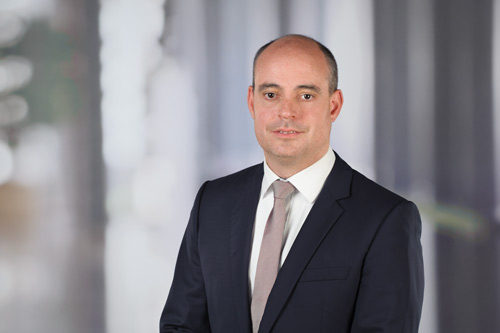"Our strategy process is the cornerstone for future success"

What were the highlights of 2023 for you as Head of the "Polymer Applications" business unit?
I am very satisfied with the progress and results of our strategy process, in which the employees of the business division were and are involved. We have defined six lead products in the three research areas of lightweight thermoplastic construction, bio-based plastics and recycling, and rubber compounds. This focus is an important basis for our future success. The projects "Digital TPC" for the digitalization of materials and processes and "HyWaSand" for the production of components for the mobility sector in thermoplastic sandwich construction have also been very successful. Together with ENGEL, we organized the very successful "Development meets series production" conference at the Fraunhofer PAZ in Schkopau and also used this opportunity to present the new profile of the business unit and the expanded equipment options at the PAZ. I was very pleased with the positive feedback we received after the event and we are now hoping for numerous joint projects following this impetus.
What advantages does cooperation with your business unit offer industrial customers? Which sectors do you address in particular?
With our materials expertise from microstructure to implementation on a pilot plant scale, we offer our clients the evaluation and improvement of the performance and efficiency of their products. With this in mind, we have solutions for the use of high-performance, customized and sustainable materials. In this way, we also support the industry in its transformation towards sustainable plastics technology. With our extensive and modern equipment, we cover the value chain from the choice of formulation and material design through process optimization and simulation to component production on an industrial scale and quality control. We work across all industries and offer our clients short response times and an in-depth understanding of technology, enabling us to offer solutions quickly, even in problematic cases. Our particular expertise lies in innovative lightweight construction concepts in thermoplastic sandwich constructions, which are not only easy to produce in large quantities, but are also easy to recycle.
You took over the management of the business unit in October 2022 and initiated a strategy process in your new position. What are the next steps?
It was initially very pleasing for me to be able to draw on so many distinctive skills that were already available in the business unit, as well as a very motivated team. Together, we defined the focal points for our customers' needs and thus laid the foundation for a future-proof alignment of the business unit. The task now is to pursue this strategy continuously. To make it a success, it really has to be lived by every employee. I see a very good basis for this because, firstly, we have already involved the employees in the concept and, secondly, I also want to align the organizational structure of the business unit with this. Accompanied by corresponding roadmaps, we will gradually introduce specialist/methodologically oriented teams that match our lead products in the individual research areas. I would also like to gear our cooperation with Merseburg University of Applied Sciences, which is very important to us, towards this.
What are you looking forward to in the new year and what will be a particular challenge in 2024?
As Merseburg University of Applied Sciences now also has the right to award doctorates, we can start supervising the first doctoral students in cooperation with the Doctoral Center Engineering Sciences & Information Technologies (IWIT), which I am very much looking forward to. We have exciting ideas for projects in Fraunhofer's internal funding programs, which we hope to be able to implement. One focus of the project work will be the topic of polybutylene succinate (PBS) as a bio-based plastic. I am very confident that we will be able to make further important progress here - in the long term, we want to be able to offer our customers an industrial pilot plant here, given the right demand and suitable funding instruments. However, as in previous years, the general conditions in the environment are changing very dynamically. For example, we will have to wait and see how the federal budget debates affect funding policy. I am also curious to see what impetus the new President of the Fraunhofer Gesellschaft will provide. And, of course, I am looking forward to working with the other business units of our institute and with our customers!